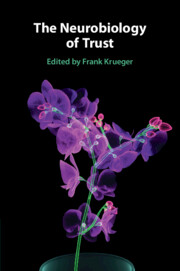Book contents
- The Neurobiology of Trust
- The Neurobiology of Trust
- Copyright page
- Dedication
- Contents
- Figures
- Tables
- Contributors
- Abbreviations
- Introduction
- Part I Fundamental Level of Trust
- Part II Neuropsychological Level of Trust
- Part III Neurocharacteristic Level of Trust
- Chapter 9 Trust and Distrust
- Chapter 10 Trust and Reciprocity
- Chapter 11 Trust and Demographics
- Chapter 12 Trust and Brain Dynamics
- Part IV Neuromolecular Level of Trust
- Part V Neuropathological Level of Trust
- Index
- References
Chapter 9 - Trust and Distrust
Key Similarities and Differences
from Part III - Neurocharacteristic Level of Trust
Published online by Cambridge University Press: 09 December 2021
- The Neurobiology of Trust
- The Neurobiology of Trust
- Copyright page
- Dedication
- Contents
- Figures
- Tables
- Contributors
- Abbreviations
- Introduction
- Part I Fundamental Level of Trust
- Part II Neuropsychological Level of Trust
- Part III Neurocharacteristic Level of Trust
- Chapter 9 Trust and Distrust
- Chapter 10 Trust and Reciprocity
- Chapter 11 Trust and Demographics
- Chapter 12 Trust and Brain Dynamics
- Part IV Neuromolecular Level of Trust
- Part V Neuropathological Level of Trust
- Index
- References
Summary
Many different scientific disciplines have come to some type of agreement as to how trust and distrust are similar to one another and how they are different. Elucidating the mechanisms involved in trust and distrust holds the important potential of improving the way people communicate with one another and are able to work effectively within groups. In this chapter, scientific literature on what constitutes trust and distrust will be summarized and reviewed. This research shows that while trust and distrust are opposite to one another in some respects, trust and distrust also each include a set of unique social, cognitive, and emotional attributes. Furthermore, this chapter seeks to develop a cohesive model of the neurobiological basis for trust vs. distrust. Lastly, this chapter will explore several open questions and directions for future research will be discussed.
- Type
- Chapter
- Information
- The Neurobiology of Trust , pp. 221 - 235Publisher: Cambridge University PressPrint publication year: 2021
References
- 1
- Cited by

